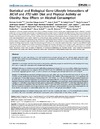Identificador persistente para citar o vincular este elemento:
https://accedacris.ulpgc.es/jspui/handle/10553/21070
| Título: | Statistical and biological gene-lifestyle interactions of MC4R and FTO with diet and physical activity on obesity: new effects on alcohol consumption | Autores/as: | Corella, Dolores Ortega-Azorín, Carolina Sorlí, José V. Covas, María Isabel Carrasco, Paula Salas-Salvadó, Jordi Martínez-González, Miguel Ángel Arós, Fernando Lapetra, José Serra-Majem, Lluis Lamuela-Raventós, R.M. Gómez-Gracia, Enrique Fiol, Miquel Pinto, Xavier Ros, Emilio Martí, Amelia Coltell, Oscar Coltell, Oscar Ordovás, José M. Estruch, Ramón |
Clasificación UNESCO: | 3206 Ciencias de la nutrición | Palabras clave: | Mediterranean diet Lifestyle Diet Physical activity Obesity, et al. |
Fecha de publicación: | 2012 | Proyectos: | Red Alimentación Saludable en la Prevención Primaria de Enfermedades Crónicas: la Red Predimed. (Retics 2006) | Publicación seriada: | PLoS ONE | Resumen: | Background: Fat mass and obesity (FTO) and melanocortin-4 receptor (MC4R) and are relevant genes associated with obesity. This could be through food intake, but results are contradictory. Modulation by diet or other lifestyle factors is also not well understood. Objective: To investigate whether MC4R and FTO associations with body-weight are modulated by diet and physical activity (PA), and to study their association with alcohol and food intake. Methods: Adherence to Mediterranean diet (AdMedDiet) and physical activity (PA) were assessed by validated questionnaires in 7,052 high cardiovascular risk subjects. MC4R rs17782313 and FTO rs9939609 were determined. Independent and joint associations (aggregate genetic score) as well as statistical and biological gene-lifestyle interactions were analyzed. Results: FTO rs9939609 was associated with higher body mass index (BMI), waist circumference (WC) and obesity (P<0.05 for all). A similar, but not significant trend was found for MC4R rs17782313. Their additive effects (aggregate score) were significant and we observed a 7% per-allele increase of being obese (OR=1.07; 95%CI 1.01-1.13). We found relevant statistical interactions (P<0.05) with PA. So, in active individuals, the associations with higher BMI, WC or obesity were not detected. A biological (non-statistical) interaction between AdMedDiet and rs9939609 and the aggregate score was found. Greater AdMedDiet in individuals carrying 4 or 3-risk alleles counterbalanced their genetic predisposition, exhibiting similar BMI (P=0.502) than individuals with no risk alleles and lower AdMedDiet. They also had lower BMI (P=0.021) than their counterparts with low AdMedDiet. We did not find any consistent association with energy or macronutrients, but found a novel association between these polymorphisms and lower alcohol consumption in variant-allele carriers (B+/-SE: -0.57+/-0.16 g/d per-score-allele; P=0.001). Conclusion: Statistical and biological interactions with PA and diet modulate the effects of FTO and MC4R polymorphisms on obesity. The novel association with alcohol consumption seems independent of their effects on BMI. | URI: | https://accedacris.ulpgc.es/handle/10553/21070 | ISSN: | 1932-6203 | DOI: | 10.1371/journal.pone.0052344 | Fuente: | PLoS ONE [ISSN 1932-6203], v. 7(12) | Derechos: | by-nc-nd |
| Colección: | Artículos |
Citas SCOPUSTM
65
actualizado el 08-jun-2025
Citas de WEB OF SCIENCETM
Citations
60
actualizado el 15-feb-2026
Visitas 10
70
actualizado el 11-ene-2026
Descargas
100
actualizado el 11-ene-2026
Google ScholarTM
Verifica
Altmetric
Comparte
Exporta metadatos
Los elementos en ULPGC accedaCRIS están protegidos por derechos de autor con todos los derechos reservados, a menos que se indique lo contrario.
